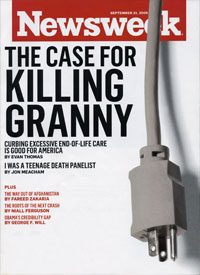
I thought we were supposed to think that Sarah Palin was nuts for bringing up “death panels.” Now a few weeks later the cover of Newsweek has a giant plug on unplugging the elderly, accompanied by a super-sized headline: “The Case for Killing Granny: Curbing Excessive End-Of-Life Care Is Good for America.” The article is by Evan Thomas, a Newsweek editor-at-large.
Right below that cover headline is the title of a second article on the same subject by Jon Meacham, Newsweek’s editor: “I Was a Teenage Death Panelist.”
Inside, Meacham explains, “Our cover this week is of course hyperbolic.” The editors aren’t yet nominating Dr. Ezekiel Emanuel, President Obama’s special adviser on health policy and brother of White House Chief of Staff Rahm Emanuel, for the top job on a plug-pulling panel.
Dr. Emanuel is the one who explained why it isn’t discrimination to discriminate against older people in favor of the young when it comes to the government’s distribution of healthcare dollars. “Unlike allocation by sex or race, allocation by age is not invidious discrimination; every person lives through different life stages rather than being a single age. Even if 25-year-olds receive priority over 65-year-olds, everyone who is 65 years now was previously 25 years.”
That’s like saying that a transgendered individual, now a woman, shouldn’t complain about sexism because she was once a man. Wacky, but that seems to be the kind of thinking that guys like Dr. Emanuel pick up at Harvard in order to be more avant-garde than the dummy-dominated hoi polloi.
In Dr. Emanuel’s case, he got a quadruple overdose of Harvard-think, receiving his M.D. from Harvard Medical School, a Ph.D. in political philosophy from Harvard, then sticking around as a fellow in the Program in Ethics and the Professions at the Kennedy School of Government at Harvard, followed by a stint as an associate professor at Harvard Medical School. Emanuel is saying that a 25-year-old who hurts himself jumping over a wall into the United States from Mexico gets a new knee from the taxpayers before a 65-year-old who’s paid into the system her whole life because the younger person has more years of life ahead of him to enjoy.
“Americans do spend an inordinate amount of money (30 percent of Medicare, for instance) on care in the last six months of life,” writes Meacham, pointing out that “R. Sean Morrison of the National Palliative Care Research Center estimates that we could save $6 billion a year if we better matched treatments to patient goals and wishes during serious illness and at the end of life.”
We saw how the central planners put together their goal of saving money with alleged “patient goals and wishes” in their “Your Life, Your Choices” booklet at the Department of Veterans Affairs. The publication, canceled by the Bush White House but resurrected by the Obama administration, asks veterans in hospitals and nursing homes whether their lives would be “not worth living” under various scenarios.
Answer in agreement to too many statements like “I can no longer contribute to my family’s well being,” “My situation causes a severe emotional burden for my family,” and “I am a severe financial burden on my family,” and a bureaucrat with an eye on the red ink might well report up the line to the plug-pullers that the patient, himself, has decided that it’s time for a shovel-ready solution.
Meacham calls the money saved by getting rid of these patients a “post-hope dividend.” The $6 billion a year in estimated savings referred to above is equal to 1.1 percent of Obama’s non-stimulating $800 billion stimulus package.
The estimate of $6 billion per year that we might squeeze out of patients by hitting them with enough guilt-inducing and depressing questions is also equal to the amount of red ink and debt that the D.C. politicians are piling up every day and a half by way of this year’s federal deficit.
Still, Newsweek’s Thomas sees granny as the super-buster of the budget. “The need to spend less money on the elderly at the end of life is the elephant in the room in the health-reform debate,” he writes. “Everyone sees it but no one wants to talk about it.”
Wrong. We are talking about it, and the more we talk, the more we’re seeing that it’s not granny who is the elephant.
Ralph R. Reiland is an associate professor of economics at Robert Morris University in Pittsburgh.


